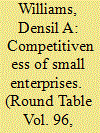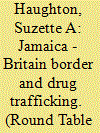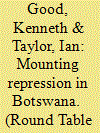| Srl | Item |
| 1 |
ID:
079668


|
|
|
|
|
| Publication |
2007.
|
| Summary/Abstract |
The rapid liberalization of the world's trading system has obliged all firms (micro, small, medium and large) to participate in the international trading system. The competitiveness of these enterprises is very important if developing economies are to secure their economic survival in this era of rapid market liberalization and erosion of trade preferences. This paper seeks to provide some insights into the competitiveness of a group of firms that have received very little attention in the debate on competitiveness and economic development. It draws on the case study method to analyse export-marketing strategies of eight small firms from Jamaica to help us analyse their ability to compete internationally and, by extension, to draw out lessons for other similar enterprises in the economy. The results reveal that the export-marketing strategies used by Jamaican small enterprises to expand exports are unsophisticated and unsustainable. The strategies pursued leave these enterprises hostage to foreign buyers, thus making their export capacity quite fickle. This therefore threatens their long-term survival and by extension the Jamaican economy. Taking greater control of the export-marketing mix is the only way these enterprises can develop sophisticated strategies that will ensure their survival in an increasingly inhospitable international trading environment
|
|
|
|
|
|
|
|
|
|
|
|
|
|
|
|
| 2 |
ID:
079664


|
|
|
|
|
| Publication |
2007.
|
| Summary/Abstract |
Increasingly global features have created new defining descriptions of borders outside the traditional notion of 'geography' or 'natural' border characteristics. But within the context of these new defining features emerge border problems similar to those experienced by geographically adjacent territories. The fresh concept of a Jamaica - Britain border is defined by differences between the economy of the former as a developing state and that of the latter as a developed state. This defining characteristic fosters the two main border problems, illegal immigration and drug trafficking, via lucrative opportunities for a better life and huge profits from drug sales. As a far more dominant border problem, drug trafficking has connected Jamaica and Britain in a drug producing and consumption web. The problematic nature of this connection has heralded bilateral efforts to curb drug trafficking across the Jamaica - Britain border. The result has been the strengthening of a Jamaica - Britain focus on border problems, particularly on drug trafficking but also on illegal immigration matters in terms of their connection to drug trafficking. This article analyses the basis for a Jamaica - Britain border. Within that context it examines the problems affecting this border. It demonstrates that Jamaican - British agreements have proven beneficial in curbing border problems across the Jamaica - Britain border region
|
|
|
|
|
|
|
|
|
|
|
|
|
|
|
|
| 3 |
ID:
079663


|
|
|
|
|
| Publication |
2007.
|
| Summary/Abstract |
Botswana is routinely celebrated as a 'model' for Africa and is habitually portrayed as an exception to the general slide to autocracy that has characterized much of post-colonial Africa. In fact, Botswana's polity is typified by an unaccountable president, an extremely weak civil society, and grotesque levels of inequality. There are growing indications that Botswana is descending to autocracy and arbitrariness and its democratic profile is in serious danger. Such realities are however seriously ignored by most academics, spellbound as they are by The African Miracle. When observers point out such anomalies, they are either physically deported from Botswana or banned from entering the country
|
|
|
|
|
|
|
|
|
|
|
|
|
|
|
|
| 4 |
ID:
079666


|
|
|
|
|
| Publication |
2007.
|
| Summary/Abstract |
The principal argument advanced in this paper is that spatial planning in the Solomon Islands has failed to deliver any substantive benefits and is therefore in urgent need of reform. The present model of planning, derived from a combination of colonial practice and legislation originating in the UK, does not add much, if any, value to the development process. The poor quality of planning in the Solomons cannot be seen in isolation. There are similar systems in use throughout much of the Commonwealth and anecdotal evidence suggests that the failings are widely duplicated. The Solomon Islands only appear exceptional in the extent to which other government systems have demonstrably broken down, following the 'Ethnic Tension' of 2000 - 03. The Regional Assistance Mission to the Solomon Islands (RAMSI) provides a unique opportunity for a review of the way in which planning operates. A number of issues are identified which any reformed system must address
|
|
|
|
|
|
|
|
|
|
|
|
|
|
|
|
| 5 |
ID:
079665


|
|
|
|
|
| Publication |
2007.
|
| Summary/Abstract |
This paper focuses upon two former British colonies - Uganda and Sudan - to illustrate the contention that civil wars in Africa are typically rooted in religio-ethnic competition and conflict. Such conflicts are normally exacerbated by group competition for material resources in circumstances of developmental failures and political instability. To attempt to deal with the problems that cause religious and ethnic conflict leading to civil war, it is necessary for African countries, including Uganda and Sudan, meaningfully to democratise - to the extent that the great majority of citizens feel that they have a stake in their country's political future. The chances of such an outcome are improved when economies show signs of growing over time and when governments manage to disseminate developmental gains relatively equitably
|
|
|
|
|
|
|
|
|
|
|
|
|
|
|
|
| 6 |
ID:
079667


|
|
|
|
|
| Publication |
2007.
|
| Summary/Abstract |
The economies of small states are vulnerable to a variety of external factors - economic, political and environmental. One economic/financial factor confronting those small states with offshore financial centres has been the effort by the OECD to eliminate tax arbitrage (harmful tax competition). A related initiative to eliminate money laundering and combat the financing of terrorism has increased the regulatory responsibilities and costs to these small jurisdictions and represents an example for the potential consequences of the OECD project. Using economic data from several Caribbean jurisdictions, this article investigates the direct impact of these international programmes to increase financial regulation upon their financial services industries. Two specific outcomes are demonstrated: a reduction in employment opportunities and a decline in government revenues. At present this situation bodes ill for the continued operation of offshore financial centres as a method towards achieving economic development
|
|
|
|
|
|
|
|
|
|
|
|
|
|
|
|